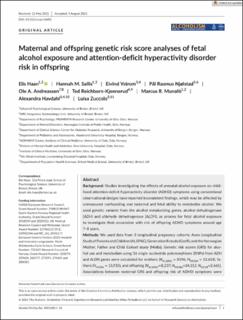Maternal and offspring genetic risk score analyses of fetal alcohol exposure and attention-deficit hyperactivity disorder risk in offspring
Haan, Elis; Sallis, Hannah M.; Ystrøm, Eivind; Njølstad, Pål Rasmus; Andreassen, Ole Andreas; Reichborn-Kjennerud, Ted; Munafo, Marcus R.; Havdahl, Alexandra; Zuccolo, Luisa
Journal article, Peer reviewed
Published version

Åpne
Permanent lenke
https://hdl.handle.net/11250/2780715Utgivelsesdato
2021Metadata
Vis full innførselSamlinger
- Department of Clinical Science [2294]
- Registrations from Cristin [9489]
Sammendrag
Background: Studies investigating the effects of prenatal alcohol exposure on childhood attention-deficit hyperactivity disorder (ADHD) symptoms using conventional observational designs have reported inconsistent findings, which may be affected by unmeasured confounding and maternal and fetal ability to metabolize alcohol. We used genetic variants from the alcohol metabolizing genes, alcohol dehydrogenase (ADH) and aldehyde dehydrogenase (ALDH), as proxies for fetal alcohol exposure to investigate their association with risk of offspring ADHD symptoms around age 7–8 years.
Methods: We used data from 3 longitudinal pregnancy cohorts: Avon Longitudinal Study of Parents and Children (ALSPAC), Generation R study (GenR), and the Norwegian Mother, Father and Child Cohort study (MoBa). Genetic risk scores (GRS) for alcohol use and metabolism using 36 single nucleotide polymorphisms (SNPs) from ADH and ALDH genes were calculated for mothers (NALSPAC = 8196; NMOBA = 13,614), fathers (NMOBA = 13,935), and offspring (NALSPAC=8,237; NMOBA=14,112; NGENR=2,661). Associations between maternal GRS and offspring risk of ADHD symptoms were tested in the full sample to avoid collider bias. Offspring GRS analyses were stratified by maternal drinking status.
Results: The pooled estimate in maternal GRS analyses adjusted for offspring GRS in ALSPAC and MoBa was OR = 0.99, 95%CI 0.97–1.02. The pooled estimate in offspring GRS analyses stratified by maternal drinking status across all the cohorts was as follows: ORDRINKING = 0.98, 95% CI 0.94–1.02; ORNO DRINKING = 0.99, 95% CI 0.97–1.02. These findings remained similar after accounting for maternal genotype data in ALSPAC and maternal and paternal genotype data in MoBa.
Conclusions: We did not find evidence for a causal effect of fetal alcohol exposure on risk of ADHD symptoms in offspring. The results may be affected by limited power to detect small effects and outcome assessment.
